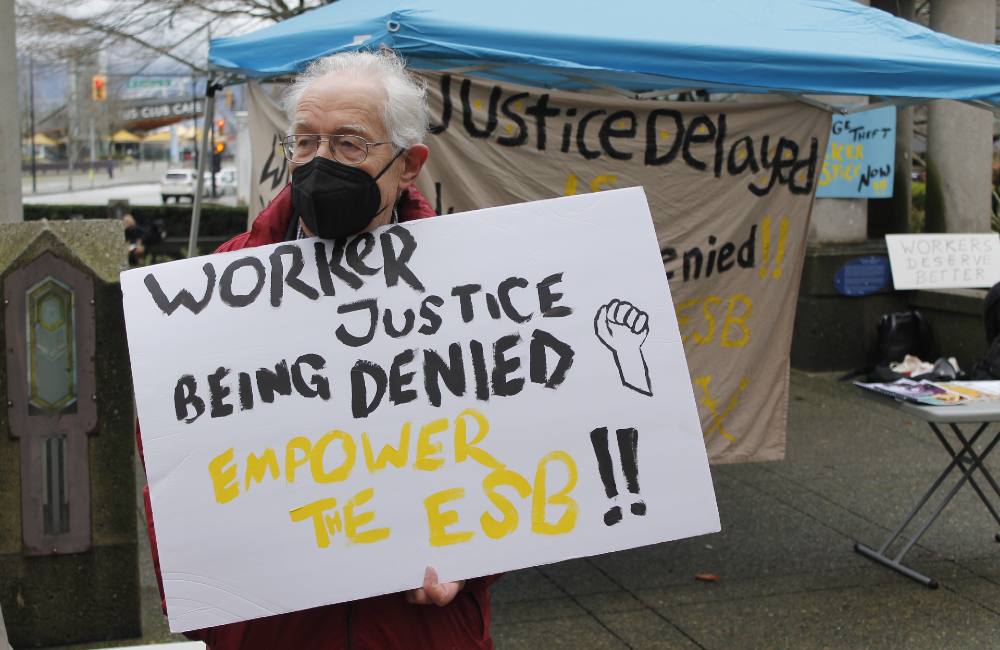The B.C. agency tasked with protecting workers’ legal rights is failing to meet its own targets in 80 per cent of the complaints it handles, leaving thousands of workers waiting months or years to recoup unpaid wages.
The province’s Employment Standards Branch aims to resolve disputes between employers and workers within 180 days, but only managed to do so in 20 per cent of the more than 7,700 cases it handled last year.
Andreea Micu, a legal advocate with the Worker Solidarity Network, says workers are often waiting a year or more to get help from the branch, whose officers can compel employers to pay workers wages, severance and other money they might be owed under the Employment Standards Act.
The branch gives low-income workers a chance to get justice without needing to hire a lawyer and sue. But Micu said the long waits have discouraged some workers from applying.
“Instead of the employer being deterred from breaking the law, it actually deters employees from going after their rights,” Micu said.
The data illustrates how the branch has struggled to fulfil its mission after what advocates describe as decades of underfunding.
In 2018, the branch received 4,937 complaints and resolved roughly 90 per cent of all the complaints it received in the 2018-19 fiscal year.
Shortly after, the NDP government removed a “self-help” requirement introduced by the former BC Liberal government that denied workers access to the branch until they had attempted to resolve complaints with the employer on their own.
Labour advocates have argued that change was necessary because the kits were difficult to complete and suppressed claims from workers.
But the result was also a jump in complaints submitted to the branch, which meant a growing caseload.
Then the COVID-19 pandemic began, sparking a wave of layoffs that only increased the branch’s workload. An internal briefing notes obtained by The Tyee say the branch had a backlog of 4,548 cases as of January 2022, a 15-per-cent decrease from the same time period the previous year.
In a written statement, the Labour Ministry acknowledged the branch has seen a “dramatic” jump in demand for its services.
BC Liberal labour critic Greg Kyllo has argued government should have foreseen the spike in caseload and the resulting delays. In a previous interview with The Tyee, he said government should collect and release more data on where complaints were coming from.
Labour advocates, though, say it is indicative of a long-term funding problem at the branch, which lost a third of its 145 staff shortly after the BC Liberals came to power in 2001. In 2017, when the NDP were elected, the branch had the equivalent of just 96 full-time employees.
“It says to us that there’s not been enough money in the branch to make sure there are enough bodies there to do the work,” BC Federation of Labour president Sussanne Skidmore said in an interview last month.
Spending on the branch has roughly doubled since the NDP formed government and staffing has increased from 96 to 142 full-time equivalents.
Earlier this year, Labour Minister Harry Bains announced the branch would get a $3-million boost to its $14-million budget this year. The branch will also receive further funding boosts on top of in the two following fiscal years, which Bains said would support the hiring of the equivalent of 33 new full-time staff.
The branch is aiming to ensure 85 per cent of all cases are resolved within six months by the 2025-26 fiscal year.
Micu, though, says action is needed faster for workers facing delays.
She says branch staff are under pressure to resolve files quickly and some new officers seem unfamiliar with the province’s labour laws.
In one case, she said, a worker who contacted the network had been rebuffed by the branch, which wrongly said claims weren’t allowed based on constructive dismissal. (Constructive dismissal involves major changes to an employee’s job which are considered the equivalent of termination.)
In other cases, Micu said, workers were offered settlements that the workers’ network considered too low given what they were owed.
“In the interest of clearing this backlog, we have workers who are not being informed about the process they are in, who are being pressured into accepting settlements that are far below what they would receive,” she said.
In a written statement, the labour minister said it was “actively recruiting and rigorously training new staff for these highly skilled and complex positions.”
Micu, though, says many workers today still face long waits. Many workers who contact her organization for help, she said, live paycheque to paycheque and cannot afford to spend months waiting for a resolution. ![]()
Read more: Rights + Justice, Labour + Industry

















Tyee Commenting Guidelines
Comments that violate guidelines risk being deleted, and violations may result in a temporary or permanent user ban. Maintain the spirit of good conversation to stay in the discussion and be patient with moderators. Comments are reviewed regularly but not in real time.
Do:
Do not: